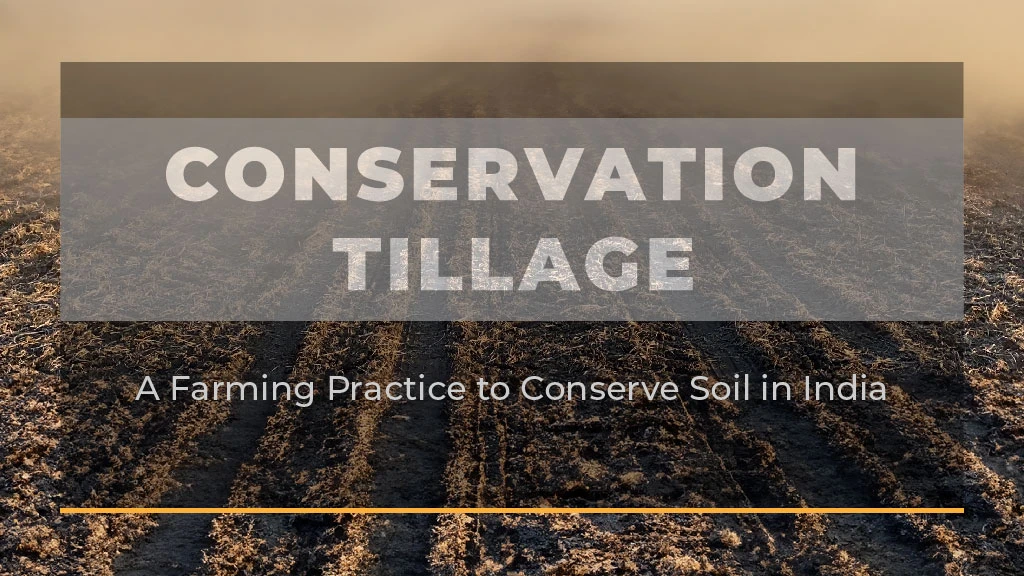Conservation Tillage: A Farming Practice to Conserve Soil in India

Among various land cultivation practices used in India, conservation tillage is a type of agricultural practice that reduces soil disturbance and disruption of soil aggregates by minimizing the number of tillage operations. It is viewed as an alternative to burning wheat and paddy stubble after harvesting and an effective method for conserving soil, generating high yields, and promoting the sustainability of agriculture. Let's discuss the popular conservation tillage practices in India along with their advantages and challenges.
Table of Contents
- What is Conservation Tillage
- What are the Popular Conservation Tillage Practices in India?
- What are the Advantages of Conservation Tillage Practices in India?
- What are the Challenges to Conservation Tillage in India?
- Conclusion
What is Conservation Tillage?
Conservation tillage is a land cultivation technique that aims at reducing runoff and erosion by maintaining plant residues. The leftovers can be corn stalks or any other crop stalks. These leftovers are used to cover the farmland both before and after planting a new crop. Simultaneously, organic residues are also used to cover at least 30% of the entire planted region. It effectively controls erosion compared to chemical technologies and contributes to water conservation in semi-arid and sub-humid areas.
What are the Popular Conservation Tillage Practices in India?
The popular conservation tillage practices used in India are no-till (zero till), minimum tillage, mulch tillage, and reduced tillage. Let’s discuss each of them one by one:
No-Till (Zero Till)
It is the extreme form of minimum tillage that eliminates soil disturbance entirely. In this process, the plant seeds are planted directly into the untilled soil without using ploughing or conventional seedbed preparation methods. This process is performed with the help of zero till. It sows seeds directly into the soil in a straight line with uniform row spacing without disturbing the soil mechanically.
Minimum Tillage
This conservation tillage approach keeps things straightforward. In place of digging the entire land, the soil is only disturbed where the seeds are sown, leaving the rest of the soil undisturbed. It can be easily done with the help of a happy seeder, which sows seeds in the field with standing stubble and without disturbing the soil.
Mulch
It is the practice of leaving crop waste on the land after harvesting. The crop residues act as a shield for the soil, protecting it from extreme temperatures and other erosive forces. Additionally, the decomposition of crop residues enriches the soil nutrients and improves its fertility. This process can be easily produced using a mulcher or shredder. Mulchers are used to prepare mulch by cutting up crop residues and other materials, such as leaves and grass.
Reduced Tillage
Reduced tillage is a middle-ground approach that aims to provide a balance between soil conservation and farming practicalities. This process minimizes the number of tillage operations while ensuring the proper placement of seeds. Reduced tillage can be performed easily using a happy seeder.
What are the Advantages of Conservation Tillage Practices in India?
Conservation tillage is a popular agricultural practice that offers numerous advantages, which include preventing soil erosion, conserving water, improving soil fertility, and economic advantages. Let's discuss them in detail:
- Preventing Soil Erosion: Soil erosion is a common problem for agriculture and food production in India. Conservation tillage is an ideal solution to tackle this problem. This practice minimizes land disturbance, resulting in soil conservation and maintaining soil quality in the long run.
- Conservation of Water: The conservation tillage practice improves water infiltration by causing minimum runoff. It benefits a country with many regions facing water scarcity. Keeping a more intact soil structure helps improve the soil's water retention capacity and reduces the impact of droughts and erratic rainfall patterns.
- Improved Soil Fertility: A mulch tillage approach leaves the plants' leftovers on the agriculture field. The leftovers decompose with time, improving the soil's fertility and crop production. Using the mulch tillage approach is beneficial for the land and ultimately helps farmers by reducing the need for chemical fertilizers and maintaining the farm's sustainability.
- Economic Advantages: Farmers can save a significant amount of money by using the conservation tillage approach. This practice requires less labour and machinery, which makes it an affordable choice. This change enhances sustainability and has a positive impact on the environment and farmers' financial well-being.
What are the Challenges to Conservation Tillage in India?
- It is quite difficult to convince farmers to practice conservation tillage due to deeply ingrained beliefs and resistance to change.
- Farmers living in remote regions lack the accessibility to the best implements for conservation tillage in India.
- Farmers have limited awareness and lack knowledge about the benefits of conservation tillage, which makes it hard for them to apply this agriculture practice.
- Conservation tillage implements are available at a high price, which is another barrier to following this approach.
Conclusion
Conservation tillage is a reliable farming technique that prioritizes the most crucial component of agriculture: soil. Choosing conservation tillage practices ensures food security and environmental sustainability, while also supporting the financial well-being of the farming community. In the modern concept of tillage, conservation tillage emerges as the most promising approach for a bright future in the Indian farming sector.
Frequently Asked Questions On Conservation Tillage: A Farming Practice to Conserve Soil in India
1. What is conservation tillage?
Conservation Tillage is an agricultural practice that reduces soil disturbance and disruption of soil aggregates by minimising the number of tillage operations.
2. What are the advantages of conservation tillage?
Conservation tillage has several advantages, such as prevention of soil erosion, conservation of water, improved soil fertility, economic advantages, etc.
3. How can conservation tillage reduce soil erosion?
Conservation tillage minimises land disturbance, which prevents soil erosion and maintains soil quality in the long run.
4. How does conservation tillage improve water use efficiency?
Conservation tillage causes minimum runoff, which ultimately improves water use efficiency.


Related Blogs















